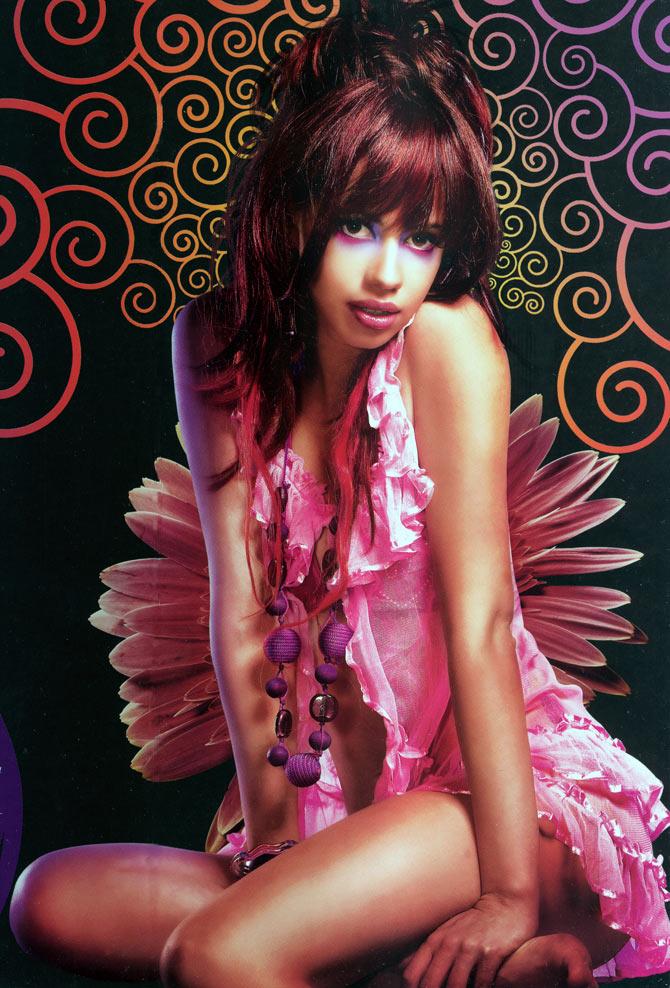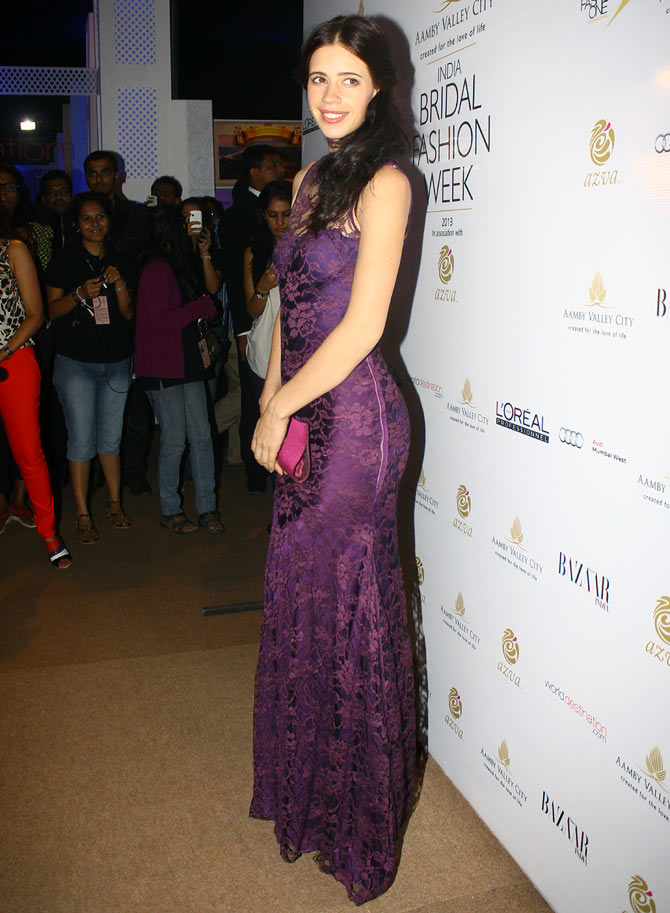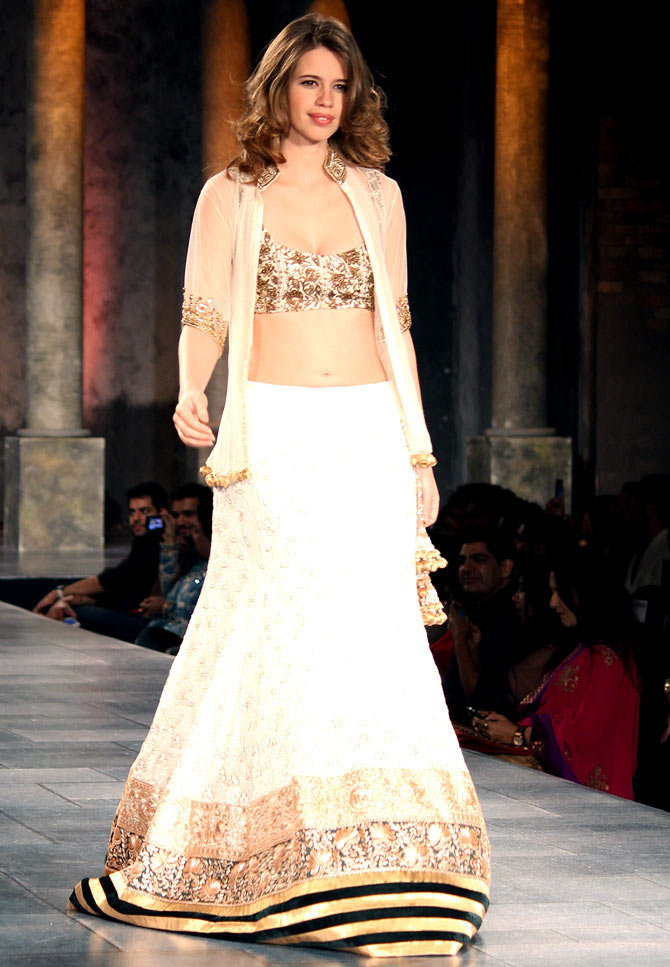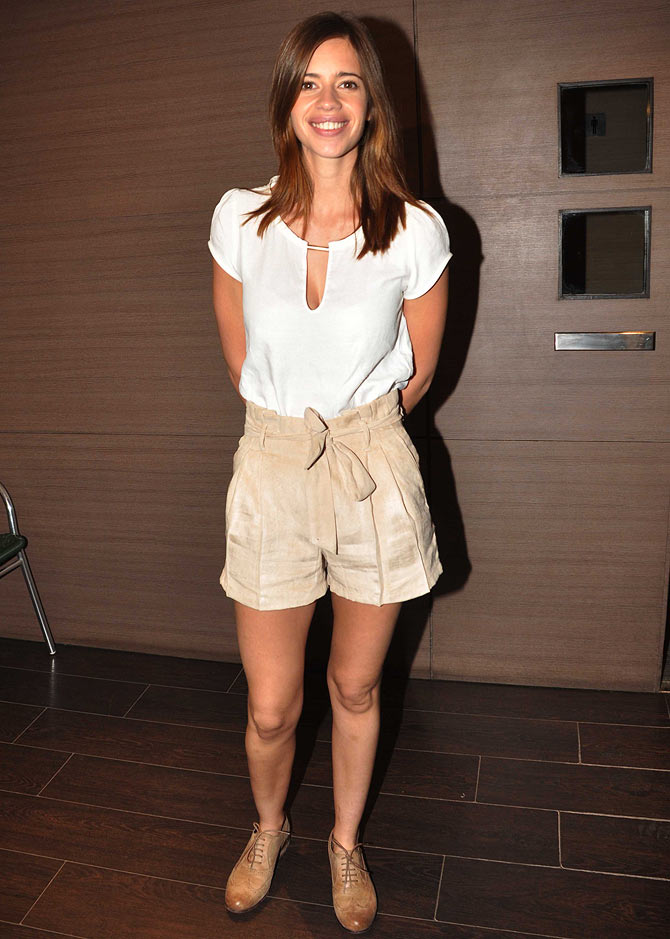Photographs: A still from Dev D Aditya Bhushan Dwivedi
Bollywood was a far-fetched dream for Kalki Koechlin considering she had never actively thought of being a part of the industry. The actress started her career in Hindi films with Dev D where she played the role of Chandramukhi and won a Filmfare award for Best Supporting Actress.
We spoke to Kalki at TEDxBITSGoa about her life, her love for theatre and storytelling, and the mistakes she made along the way.
What made you interested in theatre and films?
My parents had nothing to do with acting or theatre or films. My father is an engineer by profession; he makes microlight airplanes, and my mother was teaching French at Lycee Français in Pondicherry, one of the oldest French schools in Asia.
I grew up watching a lot of art cinema from all over the world including, films by Shekhar Kapoor, Gurudutt, and Satyajit Ray.
As a family, we would go and watch a lot of live performances and I think that's what influenced me. I joined the drama club in school and gave my first performance when I was six years old.
When did you decide that you wanted to take up theatre as a full-time career?
My parents were very keen that I go to university for higher studies. I had very little idea about what I wanted to do.
It was my English teacher who suggested that I apply to drama schools because she could see that it was something I was really into. I loved writing stories and plays and she encouraged me.
I finally went to London to do a BA in drama and theatre studies for three years. Once I started my classes, I realised how committed people were to theatre and this influenced me greatly. I also had to make a living, so I joined a theatre company.
After my graduation, I came back to India and continued to be involved in theatre. I also wrote plays and movie scripts.
You said your dad was an engineer. Was there no opposition and challenges from the family when you decided to settle for an unconventional career choice?
I am very lucky that my parents didn't force me to do what they did. I think my dad loved the fact that I would take interest in his work, but no, I never felt that pressure at all.
I don't think that my parents come from that school of thought because they themselves sort of moved all the way from France to India at a very young age. It was a big step to stay so far away from their family. They themselves were following their dreams, so they would never stop me from doing what I wanted to do.
Of course, they were very apprehensive about me becoming an actor. They were concerned how I would make money. So there were all those practical issues but in terms of what I wanted to do, they didn't limit me.
They said, 'make sure you're responsible for yourself, and don't ask us to pay your rent because you chose a career that wasn't reliable enough.'
They taught me to be responsible for myself.

'I also worked as a waitress for a while'
Photographs: Abhijit Mhamunkar
In your early years in theatre, how did you supplement your income?
In London, I was also teaching children who had dyslexia and other learning disabilities. I also worked as a waitress for a while.
In India, I did all sorts of things like modelling, writing articles and other odd stuff here and there. I didn't know where my rent money was going to come from. But I think when you really love something you find ways of doing it.
How are India and London different when it comes to appreciation of art and culture?
Went I went to London I was 18. It really influenced me as a person because I saw unbelievable and different kinds of theatre.
London is like a hub for theatre; people from all over the world come there to either learn or perform. And I even got to watch some Indian productions which I'd never seen in India. They were more appreciated in London than in India. I felt really frustrated, why we couldn't see the potential in these stories and in Indian theatre.
I guess part of why I wanted to come back here was because my stories are related somehow to India where I grew up. I felt that need to come back here and express it.
What are your views on the art of storytelling and theatre in India?
Theatre is unfortunately not very well supported as an art form; we don't get much money.
Most people I know who do theatre also do something else. They have other jobs as it's very difficult to survive solely on theatre.
I also don't just do theatre, I do films as well. But I feel that there are so many stories to tell in our country and we very often don't tell them.
If we look at a lot of our formula films and theatre, it is the same folktale or the same story that's being retold many times over. It is very rare that we get a new and original idea and yet we have so many new stories waiting to be discovered.
I just feel it's great to be a part of something where you are telling a new story.
Also see: PIX: Taking fashion lessons from Kalki
'It was only when I faced my first bout of serious long-term unemployment that I started writing'
Photographs: Hitesh Harisinghani/Rediff.com
Besides theatre, you did a lot of writing, tell us about that?
Writing is something I did from a young age. I think for me writing was therapy.
I was a very shy child and instead of telling people what I felt, I would write it down. So I would make these stories and ideas because I wasn't brave enough to live them.
I think a lot of writers are like that. And I think acting was an outlet where I started living those dreams, but yeah, writing was something that started early and I just kept doing it.
But it was only when I faced my first bout of serious long-term unemployment that I started writing. I think it comes out of frustration where you feel the need to express things.
From theatre to Bollywood, was it more of a chance or choice?
It was by chance. I mean I didn't expect to be in Bollywood. I didn't even try to be in Bollywood because first of all my Hindi was not very good, also I didn't look the part, and I was not even a dancer.
But, of course, at the same time I needed to make money.
I was doing ads and going for auditions, so when the audition for Dev D happened I was one of the actors waiting to try my luck.
Once I got the part I was so excited about it, I put in a lot of hard work and two months of Hindi tuitions.
Also see: 10 things men don't know about women: Kalki Koechlin
'Be truthful to yourself, take risks and do what you really want to do'
Photographs: Pradeep Bandekar
What were the challenges you faced when you started acting in Hindi films?
I think everybody has challenges based on how they look, how they speak, where they come from. I look like a foreigner and I have an accent and my Hindi was initially weak.
I had to work hard on these things, but at the same time I can do nothing about my appearance since I am born this way. Once I accepted this fact, I had to mould myself the best way I could.
I do stand out and look different from everybody else, but we all have our differences, if we are all the same then we would be just like robots. We should enjoy our differences.
What are your future plans?
I always say I want to write a book, but now I have learned not to plan too much because you don't know what life is going to throw at you.
But I hope that one day I will have the experience to write a book.
I am the worst planner in the world, I can't plan beyond tomorrow. I feel that it's important to live in the moment, to be focused on what you are doing right now.
What is your message to the younger generation, and what is the one mistake they should avoid?
I don't think you should avoid mistakes, please make all the mistakes. That's how you learn about life. And I think ultimately decisions have to be your own.
We are always seeking advice from other people whether it is from our religion or our gurus or some books or our teachers and parents -- we are always looking for outside influences.
But at the end of the day nobody knows yourself better than you. So be truthful to yourself, take risks and do what you really want to do.
Also see: Video: Actress Kalki Koechlin teaches you how to cook





Comment
article